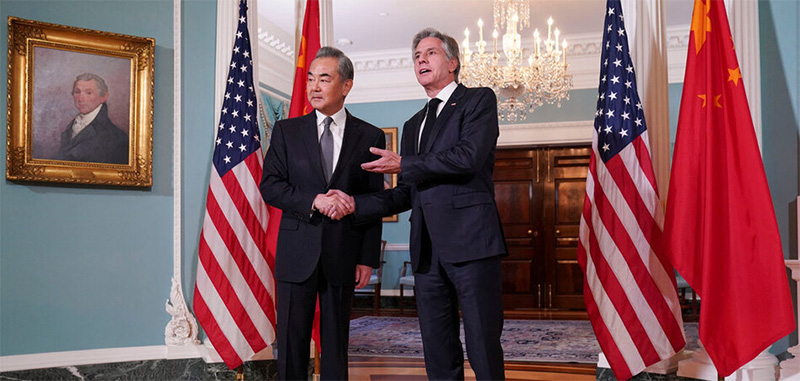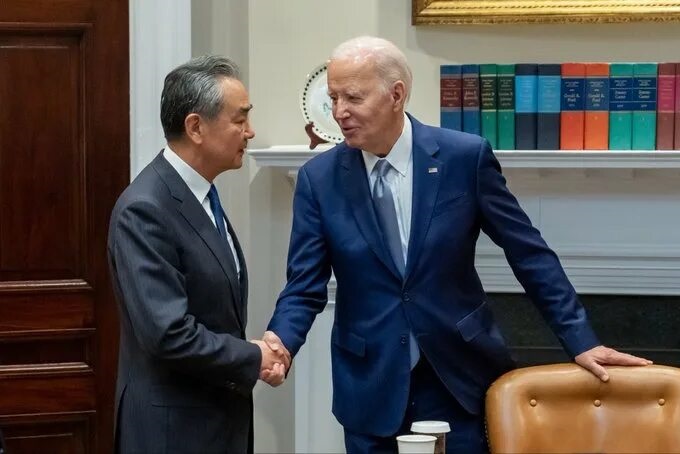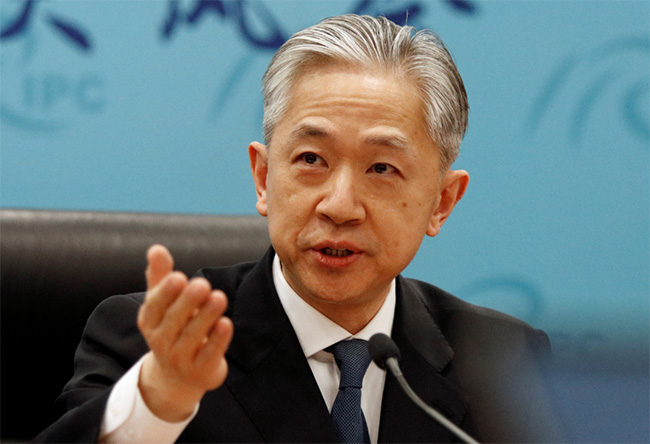 Wang Yi with Secretary of State Antony Blinken
Wang Yi with Secretary of State Antony Blinken
Wang Yi, a member of the Political Bureau of the Communist Party of China Central Committee and Chinese foreign minister, held discussions with U.S. strategists in Washington, informs Xinhua.
Wang said that during his visit, China and the United States with an attitude of equality and mutual respect had in-depth, constructive and substantive strategic communication on many issues of common concern, and jointly sent a positive signal about stabilizing and improving China-U.S. relations.
Despite various differences and disputes between the two countries, with many issues yet to be resolved, both sides believe that it is beneficial and necessary for them to maintain dialogue as two major countries.
He said both sides hope to stabilize and improve bilateral relations as soon as possible and agreed to work together toward a San Francisco summit between the two heads of state.
Meanwhile, the path to San Francisco is not smooth and cannot be left to "autopilot," said the Chinese foreign minister.
To this end, the two sides should earnestly return to what was agreed at the Bali summit, truly implement the consensus of the two heads of state, eliminate interference, overcome obstacles, enhance consensus and accumulate results, Wang said.
Wang appreciated the participants' involvement in and commitment to the development of China-U.S. relations.
He invited them to visit China more often and encouraged them to continue to make rational voices so as to play a constructive role in helping the American society develop objective views of China, correctly treat and handle the differences and disputes between the two countries, and contribute more wisdom to the healthy, stable and sustainable development of China-U.S. relations.
The participants indicated that a stable U.S.-China relationship is in the interests of both sides.
U.S.-China cooperation has played and will be playing a crucial role in solving international and regional hot-spot issues, they said.
The U.S. strategic community does not agree with the idea that U.S.-China engagement has failed and supports the two sides in resuming dialogue in various fields, promoting cooperation in economy, trade, science and technology, facilitating personnel exchanges so that misunderstanding and misjudgment can be avoided through deepening communication and enhancing understanding.
The participants said that in the face of geopolitical conflicts and global disorder, it is necessary for the United States and China to strengthen communication and jointly tackle global challenges.
Wang also had in-depth exchanges with the participants on issues of concern, such as China-U.S. military exchanges, bilateral cooperation in finance, science and technology and people-to-people exchanges, China's investment environment and market access, the situation in the Middle East as well as the Ukraine crisis.

Wang Yi met with Biden, as well as Secretary of State Antony Blinken and White House national security adviser Jake Sullivan, during a three-day visit to Washington. Both sides agreed to work toward a bilateral meeting on the side of the Asia-Pacific Economic Cooperation summit in San Francisco that begins Nov. 11, notes APN.
In an statement released by China’s foreign ministry summarizing the discussions, Wang said the road to the bilateral meeting would not be “smooth sailing” and that they could not rely on “autopilot” to make it happen.
Wang’s visit to Washington came at a time when tensions between the countries remain high, including over U.S. export controls on advanced technology and China’s more assertive actions in the East and South China seas.
The statement said that although there are still many issues to be resolved, both sides believe that it is both beneficial and necessary for the U.S. and China to maintain dialogue.
The meeting is the latest in a series of high-level contacts between the two countries as they explore the possibility of stabilizing an increasingly tense relationship at a time of conflict in Ukraine and Israel.
According to the foreign ministry statement, Wang also said that China and the U.S. needed a “return to Bali,” in a reference to Xi and Biden’s meeting at a G20 summit last year, where both officials discussed issues relating to Taiwan, U.S.-China trade tensions as well as cooperation to address issues like climate change, health and food security.
Wang said that the two countries must “eliminate interference, overcome obstacles, enhance consensus and accumulate results.”
Other issues discussed between Wang and Biden included military exchanges between the U.S. and China, as well as financial, technological and cultural exchanges and cooperation, as well as the crises in the Middle East and Ukraine.
China and the United States should have an objective understanding of each other’s strategic intention and take the correct view of competitive factors in future exchanges, China’s foreign ministry said.
China’s foreign minister met U.S. President Joe Biden and his top aides in Washington in recent days, agreeing to work together toward the expected bilateral meeting on the sidelines of an Asia-Pacific Economic Cooperation forum summit.

“Wang Yi pointed out that looking back on the tortuous course of Sino-U.S. relations since beginning of this year, the experience is worth summarising and the lessons need to be learned,” ministry spokesperson Wang Wenbin (photo) said.
In highlighting the talks, the ministry spokesperson said China’s top diplomat stressed that the most important thing is to abide by the consensus of the two heads of state, to stabilise bilateral relations between China and the United States, and to maintain open channels of communication.
China and the United States have also agreed to hold consultations on maritime affairs as well as arms control and non-proliferation in the coming days, the spokesperson said.
read more in our Telegram-channel https://t.me/The_International_Affairs

 11:46 31.10.2023 •
11:46 31.10.2023 •






















